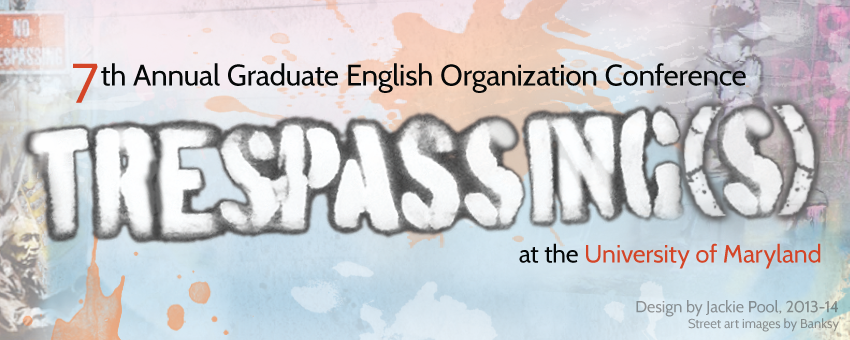7th Annual Graduate English Organization Conference
“Trespassing(s)”
Department
of English
University
of Maryland, College Park
March
7-8, 2014
In
everyday life, the phrase “NO TRESPASSING” most often asserts the integrity of
private property against intrusion. Such warnings mark legal, political, and
cultural boundaries around zones that have particular expectations of action
and even consciousness. What is acceptable in one site may be labeled taboo or
criminalized in another. Of course, the concept of trespassing is not limited
to issues of property rights and law; the idea of transgression against norms
appears in virtually all fields of inquiry. This conference will focus on ideas
of “trespassing” as a category of physical, conceptual, or representational
acts; we hope to explore both the motivations for and experiences of
trespassing as well as the structures of thought and power that define it. To
trespass is inherently a violating act, and some trespasses are perhaps only
cast as villainy. On the other hand, to trespass can also be to perform
resistance against injustice. Even so, as Fredric Jameson notes in The
Political Unconscious, “it is commonplace that transgressions, presupposing the
laws or norms or taboos against which they function, thereby end up precisely
reconfirming such laws.”
Questions
that our participants might address are: How do acts come to be defined as
transgressive? How do historical definitions of trespassing influence today’s?
How do we navigate or reorient entrenched definitions of trespass, or combat
persistently undesirable violations? Who are those that can trespass; who can
be trespassed against? How can acts of trespassing be turned against hegemony? "Is trespassing limited to the
crossing or blurring of established legal or moral boundaries? Is the negative idea of trespass essential to the
positive construction of social, political, legal, or geographical zones? How
does trespassing become innovation, or vice versa? What is changing or has
changed about the relationships between transgression and corporate or
political entities? What happens to trespassing in our era of purported
deterritorialization? How do nonhumans--animals, plants, natural objects,
artificial objects, etc.--experience or engage in trespassing? How does
trespass become impossible; when and where is the possibility or proclivity
towards transgression absent?
We
invite submissions that engage with any aspect of the conference theme, broadly
construed. Topics of potential essays can include, but are not limited to:
The conference committee will present an award for the best conference paper selected from a pool of papers submitted for consideration at least 3-4 weeks before the conference date.
Abstracts are due December 22, 2013 and should be e-mailed to conference.geo@gmail.com.
We are committed to ensuring access and inclusion during the event for all attendees and participants. Please contact the conference committee with any concerns, questions, or specific accommodations.
- Law, and Literature, Art and Culture
- Affect and Trespassing
- Property, Privacy, and Subjectivity
- Bodies and Borders: Immigration, Tourism, Exchange
- Reading/Writing against the Academic Grain
- “Breaking Bad”: Becoming/Being a Transgressive Subject
- Villains and Villainy
- Transgression and Redemption
- Innovation in Science and Technology
- “Matter Out of Place”
- Experimental Literature and Art
- Banned Books
- Original Sin: Founding Culture and History in Transgression
- War, International Law, and Representation
- Civil/Uncivil Disobedience
- Frontier Fantasies: Trespassing without Consequence
The conference committee will present an award for the best conference paper selected from a pool of papers submitted for consideration at least 3-4 weeks before the conference date.
Abstracts are due December 22, 2013 and should be e-mailed to conference.geo@gmail.com.
We are committed to ensuring access and inclusion during the event for all attendees and participants. Please contact the conference committee with any concerns, questions, or specific accommodations.
